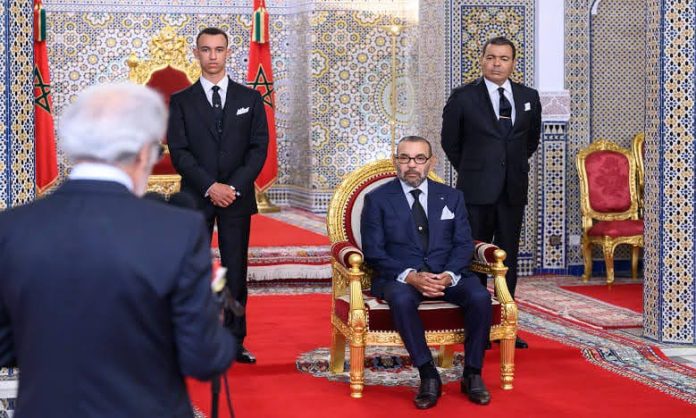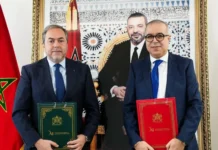On Monday, at the Royal Palace in Tetouan, King Mohammed VI, accompanied by Crown Prince Moulay El Hassan and Prince Moulay Rachid, received Abdellatif Jouahri, the Governor of Bank Al-Maghrib. Jouahri presented the King with the central bank’s annual report on the economic, monetary, and financial situation for the year 2023.
During his address to the King, Jouahri highlighted that despite a challenging international environment, successive years of drought, and a devastating earthquake in the Al-Haouz region, the national economy showed notable improvement with a growth rate of 3.4%.
Jouahri reported a decrease in inflation, which peaked at 10.1% in February but averaged 6.1% by the end of the year, down from 6.6% in 2022. This decline was attributed to reduced external inflationary pressures, governmental measures, and tighter monetary policy by Bank Al-Maghrib, which also ensured all liquidity demands from banks were met.
However, the labor market faced significant challenges in 2023, with a loss of approximately 157,000 jobs, predominantly in the agricultural sector. Although other sectors showed relative improvement, it was insufficient to offset the decline in agricultural employment.
On the public finance front, Jouahri noted ongoing fiscal consolidation, with the deficit narrowing to 4.4% of GDP, driven by robust tax revenues and innovative financing mechanisms, including resources mobilized through the “Special Fund for Earthquake Management” established under Royal directives.
Externally, the current account deficit decreased to 0.6% of GDP, thanks to the continued dynamism of the automotive industry, travel revenues, and remittances from Moroccans abroad. Bank Al-Maghrib’s official reserve assets increased to 359.4 billion dirhams, equivalent to nearly five and a half months of imports.
Despite various constraints and successive shocks, Morocco maintained and even expanded its reform agenda and structural economic and social projects, bolstered by its political and social stability. This approach, along with Morocco’s credibility as a reliable partner, earned positive evaluations from international institutions, facilitated access to financial markets, and enabled hosting the annual meetings of the World Bank and IMF in October.
Jouahri emphasized the need to sustain this momentum, consolidate achievements, and ensure their sustainability. Key transitions initiated by the King must be managed effectively, including enhancing social dialogue to support Morocco’s transition to a welfare state, considering work conditions, social justice, and reducing inequalities.
A successful transition to a green and sustainable economy requires accelerated policies against climate change and strengthened effectiveness and coherence. The digital transition’s success hinges on improved public infrastructure, education quality, digital culture promotion, and a conducive environment for a digital ecosystem.
In the financial sector, Bank Al-Maghrib plans to establish a Fintech Fund in collaboration with stakeholders to provide financial support and project development assistance. This initiative aligns with the broader goal of harnessing technological advancements to drive economic growth.
Jouahri concluded by emphasizing the need for significant resources, suggesting that sustainable mobilization would require private sector and foreign partner involvement. He affirmed Morocco’s continued pursuit of emergence and prosperity, focusing on human capital development, governance enhancement, business environment improvement, and maintaining macroeconomic stability. This vision aligns with the King’s call in his Throne Day speech for national unity and prioritizing the national interest.
Finally, Abdellatif Jouahri presented King Mohammed VI with Bank Al-Maghrib’s annual report on the economic, monetary, and financial situation for 2023.





